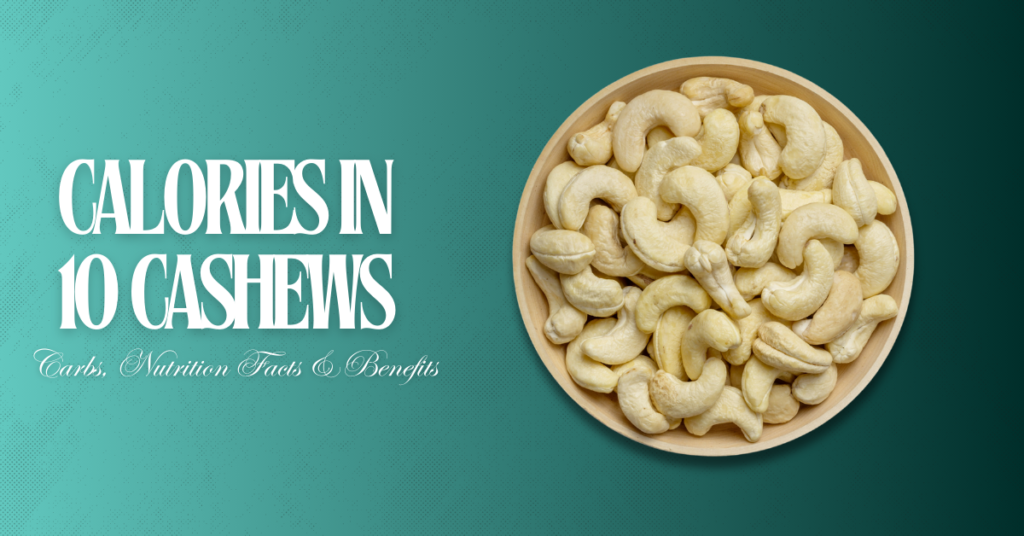
Calories in 10 Cashews: Carbs, Nutrition Facts & Benefits
Cashews are a popular nut enjoyed around the world. They are known for their creamy texture and rich flavor. People often eat cashews as a snack, use them in cooking, or add them to salads and desserts. But how many calories are in 10 cashews? What nutrients do they contain? And what are the benefits of eating them? Let’s explore these questions in detail.
Calories in 10 Cashews
When you eat 10 cashews, you consume about 98 calories. This number can vary slightly depending on the size of the cashews, but it’s a good estimate. Cashews are relatively high in calories compared to some other snacks, but they also provide a lot of nutrition in a small package.
Carbohydrates in Cashews
Carbohydrates are one of the three main types of nutrients found in food, along with proteins and fats. They provide energy for your body. In 10 cashews, there are about 8 grams of carbohydrates. This includes both simple sugars and complex carbohydrates. The simple sugars give you a quick boost of energy, while the complex carbs provide a more sustained source of fuel.
Nutritional Facts
Cashews are not just about calories and carbs. They are packed with other important nutrients. Here is a breakdown of the nutrition facts for 10 cashews:
- Calories: 98
- Carbohydrates: 8 grams
- Protein: 3 grams
- Fat: 8 grams
- Fiber: 1 gram
- Sugar: 1 gram
Vitamins and Minerals
Cashews are also rich in vitamins and minerals, which are essential for good health. Some of the key vitamins and minerals found in cashews include:
- Vitamin E: An antioxidant that helps protect your cells from damage.
- Vitamin K: Important for blood clotting and bone health.
- Magnesium: Supports muscle and nerve function and helps maintain a healthy immune system.
- Phosphorus: Essential for healthy bones and teeth.
- Copper: Helps your body make red blood cells and keeps your immune system healthy.
- Manganese: Important for bone formation and metabolism.
Health Benefits of Eating Cashews
Eating cashews can provide several health benefits. Here are some of the key benefits:
Heart Health
Cashews are good for your heart. They contain healthy fats, such as monounsaturated and polyunsaturated fats, which can help lower bad cholesterol levels. Lower cholesterol levels reduce the risk of heart disease and stroke. Additionally, the magnesium in cashews helps maintain a healthy heart rhythm.
Weight Management
While cashews are high in calories, they can still be part of a healthy diet for weight management. The protein and fiber in cashews can help you feel full and satisfied, reducing the likelihood of overeating. They are also a nutrient-dense snack, meaning they provide a lot of nutrition without too many calories.
Bone Health
Cashews are rich in minerals like magnesium and phosphorus, which are important for bone health. Magnesium helps regulate calcium levels in the body, which is crucial for strong bones. Phosphorus is a major component of bones and teeth. Eating cashews can help keep your bones healthy and strong.
Immune System Support
The vitamins and minerals in cashews, such as vitamin E, zinc, and copper, support a healthy immune system. Vitamin E acts as an antioxidant, protecting your cells from damage. Zinc is important for immune cell function and wound healing. Copper helps produce and maintain immune cells.
Eye Health
Cashews contain antioxidants like lutein and zeaxanthin, which are beneficial for eye health. These antioxidants protect your eyes from damage caused by free radicals and reduce the risk of age-related macular degeneration and cataracts.
How to Incorporate Cashews into Your Diet
There are many ways to enjoy cashews as part of your diet. Here are some ideas:
- As a Snack: Eat a handful of cashews on their own for a quick and nutritious snack.
- In Salads: Add cashews to your salads for a crunchy texture and a boost of protein.
- In Cooking: Use cashews in stir-fries, curries, and other dishes for added flavor and nutrition.
- In Smoothies: Blend cashews into your smoothies for a creamy texture and extra nutrients.
- In Baking: Use cashews in cookies, cakes, and other baked goods for a tasty twist.
Potential Allergies and Considerations
While cashews offer many health benefits, it’s important to be aware of potential allergies. Nut allergies are common, and cashews can cause allergic reactions in some people. Symptoms of a cashew allergy can include itching, swelling, difficulty breathing, and anaphylaxis. If you have a nut allergy, it’s best to avoid cashews and consult with a healthcare provider.
Additionally, cashews contain oxalates, which can contribute to the formation of kidney stones in susceptible individuals. If you have a history of kidney stones, you may want to limit your intake of cashews.
Storing Cashews
To keep cashews fresh and prevent them from going rancid, it’s important to store them properly. Here are some tips for storing cashews:
- In a Cool, Dry Place: Store cashews in an airtight container in a cool, dry place, away from direct sunlight.
- In the Refrigerator: For longer storage, keep cashews in the refrigerator. They can stay fresh for up to six months.
- In the Freezer: If you need to store cashews for an extended period, you can freeze them. They can last up to a year in the freezer.
Cashews are a delicious and nutritious nut that can be enjoyed in many different ways. Eating 10 cashews provides about 98 calories, 8 grams of carbohydrates, and a host of other important nutrients, including protein, healthy fats, vitamins, and minerals. The health benefits of cashews include improved heart health, weight management, strong bones, a healthy immune system, and better eye health. However, it’s important to be mindful of potential allergies and to store cashews properly to maintain their freshness. By incorporating cashews into your diet, you can enjoy their tasty flavor and numerous health benefits.



